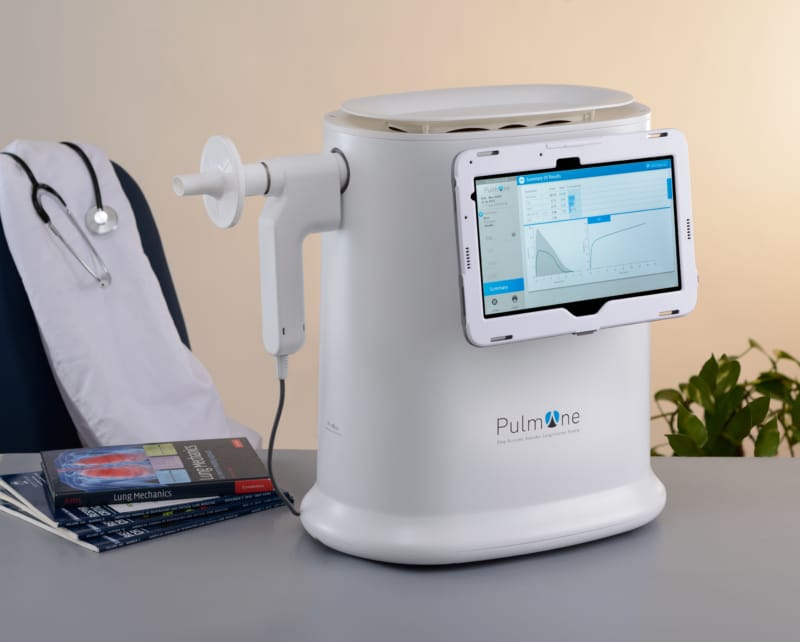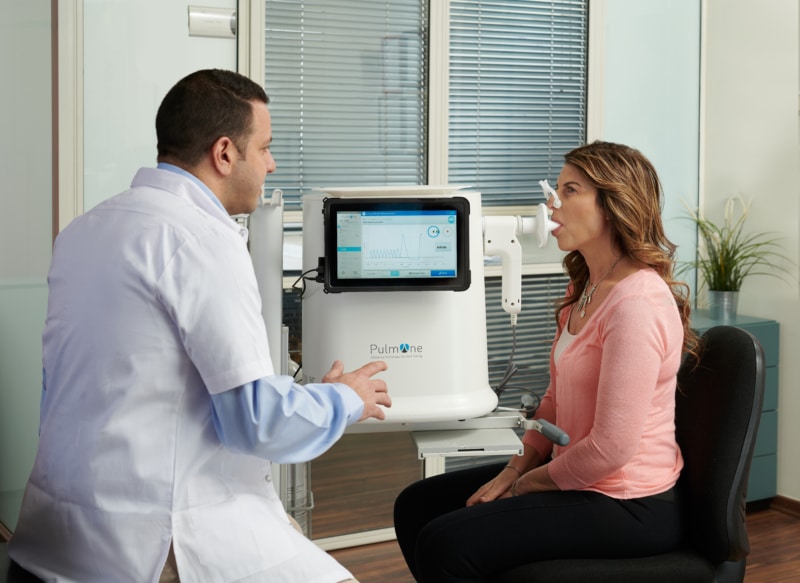What Is A Pulmonary Function Test?
Pulmonary Function Tests (PFTs) measure how well your lungs are working by measuring how much air your lungs can hold, how quickly you can blow air out of your lungs, how well gas is transferred from the lungs to your bloodstream, and how well your lungs respond to pulmonary medications. The test will look for two kinds of respiratory disorders: obstructive and restrictive.
01
Obstructive
Occurs when air flow out of the lungs is limited.
02
Restrictive
Occurs when lung or chest wall expansion is decreased, which limits the volume of air brought into the lungs.
What Are the Reasons to Get Pulmonary Function Testing?
Your provider may recommend a Pulmonary Function Test if you are experiencing any of these symptoms:
- Shortness of breath or difficulty breathing
- Presence of workplace exposure to lungs-damaging chemicals
- Coughing or wheezing
What Conditions IT Helps Diagnose
Pulmonary Function Testing will help your provider diagnose and manage chronic lung diseases such as asthma, chronic obstructive lung disease (COPD), and interstitial lung diseases. These tests provide information about how well your lungs are working. Your provider will use this information to make decisions about your treatment.

How Are Pulmonary Function Tests performed?
When you undergo Pulmonary Function Testing, you will have a soft nose clip on your nose and will use a mouthpiece with tubing connected to a device that is able to measure your different lung volumes and gas exchange in the lungs.
Depending on which components of the PFT are ordered for you, the test may last 5-20 minutes.
None of the tests are painful or require uncomfortable breathing maneuvers.
Types of Pulmonary Function Tests
Spirometry
Lung Volumes
Six-Minute Walk Test
Exhaled Nitric Oxide Test
Lung Diffusion Capacity
Don't let asthma hold you back
Many of our clinics offer Pulmonary Function Tests to help patients find relief and freedom from chronic lung disease. Find a location near you and see one of our board-certified allergists today!
Find an Asthma Specialist
How to Prepare for a Pulmonary Function Test
Discuss the test in advance with your provider so you will be prepared. Let your provider know if you are on oxygen as well as what medications you are taking.
We also advise you to wear loose clothing and avoid any tight jewelry. Before you go in for testing, you may be asked to:
- Stop taking your routine daily pulmonary medications.
- Don’t smoke at least 12 hours before your test.
- Don’t use your rescue inhaler for 4-6 hours before test.
Pulmonary Function Tests Side Effects and Risks
You will be closely monitored during the test and your provider will be prepared to address any discomfort or concerns. The risks associated with a pulmonary function test are small but patients may rarely experience:
- Dizziness during the tests
- Feeling short of breath
- Coughing or wheezing
In some cases, patients shouldn’t undergo testing IF:
- They have had recent surgery on their stomach, chest, eye, ear or brain.
- They have chest pain, recent heart attack, or an unstable heart condition.
- Have a bulging blood vessel (aneurysm) in the chest, stomach, or brain.
- Have active tuberculosis (TB) or respiratory infection, such as a cold or the flu.
Pulmonary Function Test Results
Most of the time, your allergist will have your test findings accessible right away and go over them with you. They may suggest more tests or adjustments to your existing treatment plan based on the findings. Your PFT results will be evaluated in relation to those of a wide population of individuals with similar demographics to your own (height, gender, age, and ethnicity).






